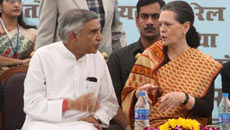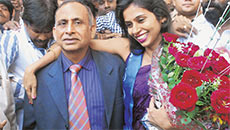It is true that every anti corruption movement in recent history has decisively shifted the centre of gravity of Indian politics yards to the right, as writers have asserted recently. Such campaigns have always had considerable media support.
Internal tussles have had their external stimuli quite consistently until the Soviet Union collapsed in 1990-91. Thereafter, free from external ideological pressures, Prime Minister P.V. Narasimha Rao set Manmohan Singh, his finance minister, on a new path. This became Manmohan Singh’s chosen route even during his own two terms as prime minister. He hitched his wagon to a hyperpower seeking full spectrum global dominance, and sometimes by that association looked energetic during UPA-I.
The hyperpower started running out of steam by 2008 when Lehman Brothers collapsed, signaling structural flaws in the engine of capitalism. That is the development after which Manmohan Singh has looked limp and directionless throughout UPA-II.
The current hype around Narendra Modi is designed to provide the contrast. The alternative to Modi is no longer the Congress but a coalition of muscular, regional parties with help from either of the mainstream parties. Brooding over this politics, like Banquo’s ghost, is the AAP’s Arvind Kejriwal. His contribution to the outcome of these elections will be only known May 16, when the results are declared.
One achievement must be credited to him straight away. He has removed the screen behind which Congress and the BJP romance. Kejriwal has taken full advantage of the media attention - at the India Today Conclave, for instance - to tear into the Congress-BJP collusion. Will this considerable expose not have a bearing on the election? That the two parties are indistinguishable on economic and social issues cannot be lost on the electorate, particularly minorities. Look at the list of their candidates: they are both equally thick skinned on corruption.
The situation poses an interesting question. As mentioned at the outset, all anti corruption campaigns have provided occasion for politics to be shifted further to the right. In which direction will Kejriwal’s double-fisted assault on both, the BJP and the Congress, shift Indian politics?

“Crony capitalism” is clearly in his target. This cannot be honeyed music to “crony capitalists” who have controlling interests in both the national parties.
When one considers the ideological infighting within the Congress upto and after Independence, Jawaharlal Nehru comes across as something of a Samson, holding on his shoulders the temple of a secular, socialist republic. On all social and foreign policy issues his colleagues, Sardar Patel, Rajendra Prasad, Rajaji - were all suspicious of non-alignment. They would have taken India into the Western camp from day one of Independence. Don’t forget, it was only “transfer of powers” that took place in 1947.
It were the ideological heirs of Nehru’s opponents who in 1969 sought to wrench the party away from Indira Gandhi’s socialist platform. There was considerable external support to Indira’s instinctive moves. After all, Indo-Soviet relations peaked during the 1971 Bangladesh war.
This was the phase of lightening moves and counter moves on the international and the national chess board. Just when New Delhi was at its coziest with Moscow, Zulfiqar Ali Bhutto facilitated Henry Kissinger’s secret visit to Beijing. Then, by a splendid irony, next year, in 1972, Indira Gandhi and Bhutto were face to face at the Shimla Summit.
When Indira plotted to split the Congress in 1969, she prepared the ground by relieving Morarji Desai of the finance portfolio. He resigned.
But Morarji Desai, shown the door by Indira in 1969, became the prime minister of the Janata Party led government in 1977. By 1999, intermediate stages were no longer required by Hindu nationalism’s moderate Atal Behari Vajpayee to become prime minister for a full term.
It is not surprising therefore that this year, Narendra Modi was being audaciously built up as the mascot for good governance and Hindu nationalism.

This is when Kejriwal may have spoilt Modi’s party. For the last four months AAP has been pegging away at his crony capitalist links. The media is playing down the negatives. The results May 16 will establish how much of Modi’s sheen was lost by being exposed to charges of corruption.
Will Modi’s progress be checked by an anti corruption campaign? This will be the first time that such a campaign has not boosted the Right.





